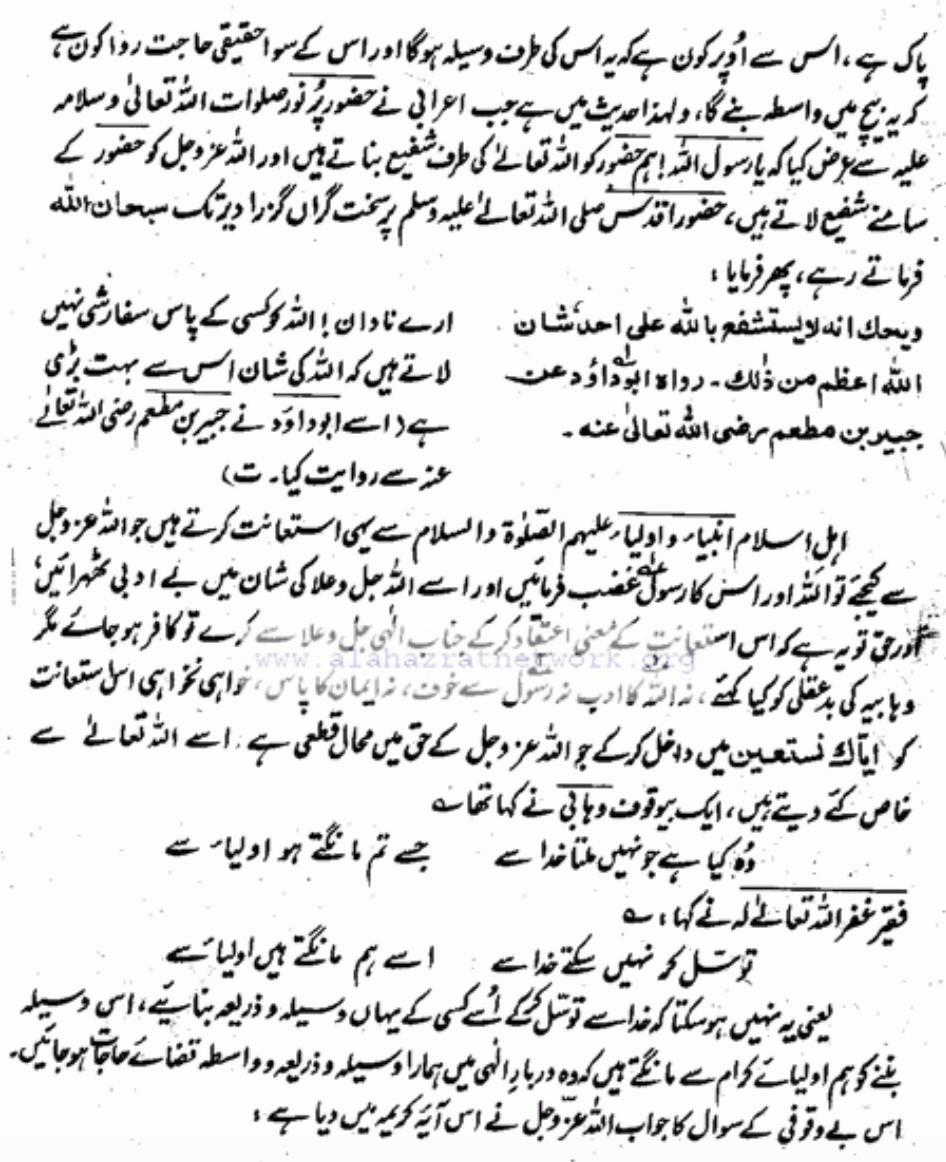WHY PRACTICE ISTIÁĀNAH [SEEKING HELP]?
Imām Aĥmad Riđā Khān al-Baraylawī writes:
This is the case for Istiáānah [seeking help] and seeking aid; That the reality of it is specifically from Allāh, and from others it is with the meaning of Wasīlah, Tawassul and intercession,


Imām Aĥmad Riđā Khān al-Baraylawī writes:
This is the case for Istiáānah [seeking help] and seeking aid; That the reality of it is specifically from Allāh, and from others it is with the meaning of Wasīlah, Tawassul and intercession,



is established and definitively permissible. Rather, this meaning is specific to other than Allāh; Allāh is pure from [being used for] Wasīlah, Tawassul and intercession. Who is there above Allāh, that He could be a Wasīlah towards?
Who is the real fulfiller of needs besides Allāh, that He could be an intercessor between? It is for this reason that it is in the Ĥadīth, that when the bedouin said to RasūlAllāh ﷺ, “Yā RasūlAllāh! We make you an intercessor to Allāh, and we make Allāh an intercessor to you”,
it was very grievous upon him, and he kept reciting SubĥānAllāh for a period of time. Then he proclaimed, “Woe to you! Allāh is not made an intercessor to anyone, Allāh’s status is greater than that.” Narrated by Abū Dāwūd from Jubayr ibn Muţím رضي الله عنه.
The Muslims perform this Istiáānah with the Anbiyā’a and Awliyā’a عليهم السلام, that if it were done with Allāh, it would invite the Wrath of Allāh and the Rasūl ﷺ, and it would be considered disrespectful to the status of Allāh. The reality is,
if one holds the belief of this meaning of Istiáānah and performs it with Allāh, then he will become a Kāfir, but what can we say to the irrationality of the Wahhābīyyah? No Adab for Allāh, nor fear of the Rasūl ﷺ, nor regard for Īmān. Willingly or unwillingly,
by including Istiáānah under, “You alone we seek help”, they make what is clearly impossible for Allāh to be specific for Him. One foolish Wahhābī said, “What is it, that you do not get from Allāh, that you ask from the Awliyā’a?” This Faqīr, may Allāh forgive him, has said,
“We cannot do Tawassul with Allāh, it is that which we ask from the Awliyā’a.” Meaning, this cannot be that by doing Tawassul with Allāh we can make Him a Wasīlah and a means to someone. We ask the Awliyā’a Kirām to be that Wasīlah, that they be our Wasīlah, our means,
our intercessors in the Court of Allāh for our needs to be fulfilled. Allāh has given the answer to this foolish question in this verse:
“And if they, when they have wronged their own souls, come humbly to you and seek forgiveness from Allāh
“And if they, when they have wronged their own souls, come humbly to you and seek forgiveness from Allāh
and the Noble Messenger intercedes for them, they will certainly find Allāh as the Most Acceptor Of Repentance, the Most Merciful.”
What, could Allāh táālā not forgive by Himself? Why then did Allāh declare, “O Nabī! They present themselves to you,
What, could Allāh táālā not forgive by Himself? Why then did Allāh declare, “O Nabī! They present themselves to you,
and you seek forgiveness for them from Allāh, then they will receive this prosperity and blessing”?
It is this which is our objective, which this verse of the Qur'ān is clearly stating, however the Wahhābīyyah do not possess understanding.
It is this which is our objective, which this verse of the Qur'ān is clearly stating, however the Wahhābīyyah do not possess understanding.
• • •
Missing some Tweet in this thread? You can try to
force a refresh


















